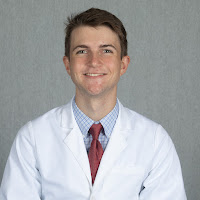 |
| Skyler Hamilton |
Hundley, associate dean for medical education, then announced the winners of two awards: the Community Service Certificate of Honor for completing the most community service hours during the M1 year and the Professional Development Certificate of Honor for earning the most professional development credits in the first year.
Hamilton was surprised to learn she was the recipient of both. “When Dr. Hundley called my name, my stomach dropped and I couldn't stop smiling,” she said. “I was completely blown away but honored all in the same moment.”
Hamilton, who serves as secretary for the Class of 2027, is involved in many initiatives, including weekly tutoring at Wilmer Hall Children’s Home, providing patient education at the USA Student-Run Free Clinic, volunteering at the Hispanic Health Fair, and participating in several student interest groups. She has also shadowed colorectal surgeon Lee Grimm, M.D., a professor of surgery.
Hamilton said she does not engage in community service for any awards or recognition, however. “I do it because giving back to the community makes me feel whole,” she said. “I love serving my community in any way I can because that is what I was put on this earth to do. That has always been my primary motivation for pursuing a career in medicine. I just love helping people any way that I can.”
 |
| Ben Cockrell |
“I was honored and pleasantly surprised when I received this award,” Cockrell said. “Everyone in my class is involved in organizations that have a huge positive impact in our community, and I was surprised to have the most logged community service hours for the class.”
He volunteers with Rapahope for children diagnosed with cancer and their families, serves as a mentor in the Big Brothers Big Sisters program, and works with Heart for Athletes, an organization his mother started that provides free heart screenings for young people. He also serves as one of the patient education coordinators at the USA Student-Run Free Clinic, where he leads or coordinates sessions on topics like diabetes and hypertension.
Brandon Schonour, a third-year medical student, received the Professional Development Certificate of Honor for earning the most professional development credits in the Class of 2026 during his M2 year.
 |
| Brandon Schonour |
He also volunteered over the course of the year with the Quatsabadi STEM Mentoring Program, which aims to help Native American high school students explore professions in healthcare. Additionally, he served as president of the Native American Student Association at USA, leading the group in hosting lectures, volunteering in the community, and working with local tribes to create more awareness about Indigenous issues as well as support Native students on campus.
“Leading the group in this way, I feel, will help prepare me for the future when I will need to step into a similar leadership role as a member of interprofessional teams in the healthcare setting,” he said.
Schonour said he was shocked by receiving the professional development honor. “I know that my fellow classmates consistently go above and beyond by doing so much outside of the classroom, whether it be in the community performing acts of service, in the lab doing research, and so much in between,” he said. “To be able to represent the class with this award is a real honor that I am truly thankful for.”



.jpg)





